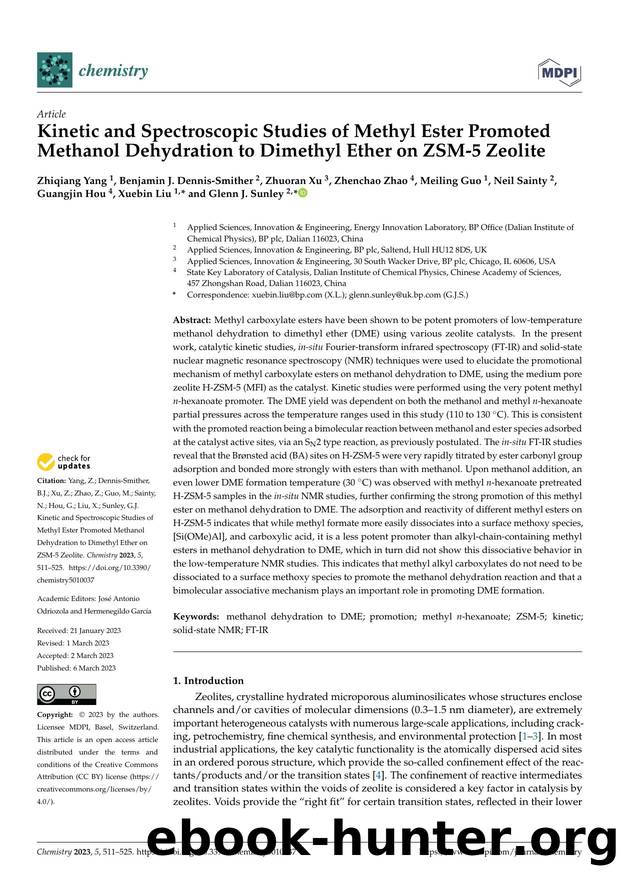Kinetic and Spectroscopic Studies of Methyl Ester Promoted Methanol Dehydration to Dimethyl Ether on ZSM-5 Zeolite by unknow

Author:unknow
Format: pdf
Tags: Methyl carboxylate esters have been shown to be potent promoters of low-temperature methanol dehydration to dimethyl ether (DME) using various zeolite catalysts. In the present work, catalytic kinetic studies, in-situ Fourier-transform infrared spectroscopy (FT-IR) and solid-state nuclear magnetic resonance spectroscopy (NMR) techniques were used to elucidate the promotional mechanism of methyl carboxylate esters on methanol dehydration to DME, using the medium pore zeolite H-ZSM-5 (MFI) as the catalyst. Kinetic studies were performed using the very potent methyl n-hexanoate promoter. The DME yield was dependent on both the methanol and methyl n-hexanoate partial pressures across the temperature ranges used in this study (110 to 130 C). This is consistent with the promoted reaction being a bimolecular reaction between methanol and ester species adsorbed at the catalyst active sites, via an SN2 type reaction, as previously postulated. The in-situ FT-IR studies reveal that the Brønsted acid (BA) sites on H-ZSM-5 were very rapidly titrated by ester carbonyl group adsorption and bonded more strongly with esters than with methanol. Upon methanol addition, an even lower DME formation temperature (30 C) was observed with methyl n-hexanoate pretreated H-ZSM-5 samples in the in-situ NMR studies, further confirming the strong promotion of this methyl ester on methanol dehydration to DME. The adsorption and reactivity of different methyl esters on H-ZSM-5 indicates that while methyl formate more easily dissociates into a surface methoxy species, [Si(OMe)Al], and carboxylic acid, it is a less potent promoter than alkyl-chain-containing methyl esters in methanol dehydration to DME, which in turn did not show this dissociative behavior in the low-temperature NMR studies. This indicates that methyl alkyl carboxylates do not need to be dissociated to a surface methoxy species to promote the methanol dehydration reaction and that a bimolecular associative mechanism plays an important role in promoting DME formation., methanol dehydration to DME; promotion; methyl n-hexanoate; ZSM-5; kinetic; solid-state NMR; FT-IR
Download
This site does not store any files on its server. We only index and link to content provided by other sites. Please contact the content providers to delete copyright contents if any and email us, we'll remove relevant links or contents immediately.
Alchemy and Alchemists by C. J. S. Thompson(2932)
The Elements by Theodore Gray(2465)
The Club by A.L. Brooks(2415)
How to Make Your Own Soap by Sally Hornsey(2374)
Drugs Unlimited by Mike Power(2209)
Wheels of Life by Anodea Judith(1636)
Cracking the Sat French Subject Test, 2013-2014 Edition by The Princeton Review(1536)
The Cosmic Machine: The Science That Runs Our Universe and the Story Behind It by Scott Bembenek(1490)
Perfume by Jean-Claude Ellena(1487)
The Flavor Matrix by James Briscione(1395)
1000 Multiple-Choice Questions in Organic Chemistry by Organic Chemistry Academy(1370)
Cracking the LSAT, 2012 Edition by Princeton Review(1366)
MCAT Physics and Math Review by Princeton Review(1322)
Cracking the SAT Premium Edition with 6 Practice Tests, 2017 by Princeton Review(1267)
Synchrotron Light Sources and Free-Electron Lasers by Eberhard J. Jaeschke Shaukat Khan Jochen R. Schneider & Jerome B. Hastings(1246)
Handbook of Modern Sensors by Jacob Fraden(1242)
A is for Arsenic: The Poisons of Agatha Christie (Bloomsbury Sigma) by Kathryn Harkup(1229)
Harry Potter All Books: 8 Books by J.k.rowling(1203)
The Thing Around Your Neck by Chimamanda Ngozi Adichie(1054)
